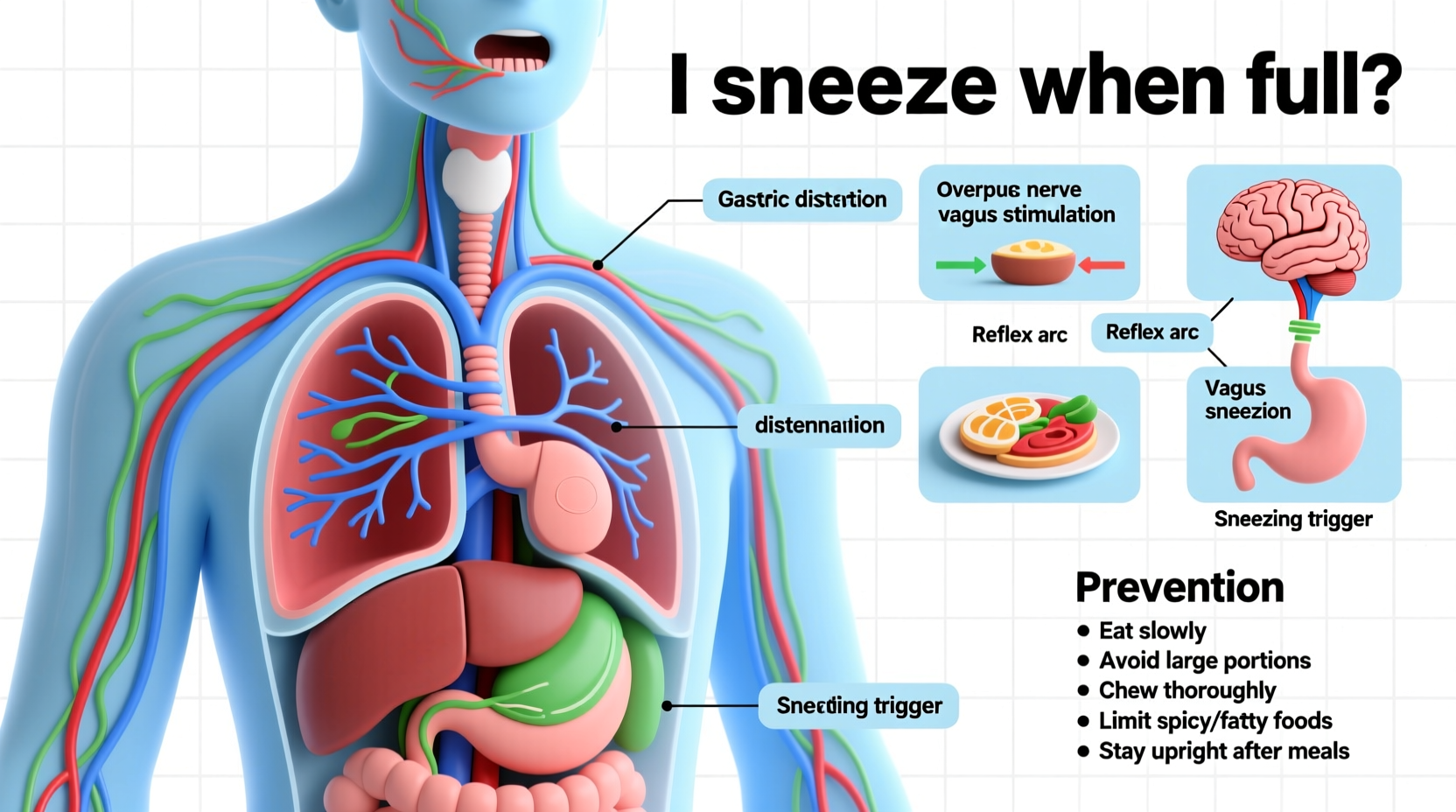It’s a familiar scenario: you finish a satisfying meal, lean back, and suddenly—achoo! Sneezing after eating, especially when feeling full, may seem odd, but it’s more common than you think. While occasional post-meal sneezing is usually harmless, understanding the underlying causes can help you manage or even prevent it. This article explores the physiological mechanisms behind this phenomenon, identifies key triggers, and offers actionable strategies to reduce its frequency.
The Science Behind Post-Meal Sneezing

Sneezing is a protective reflex designed to clear irritants from the nasal passages. However, sneezing triggered by being full doesn’t involve nasal irritation at all. Instead, it often results from a neurological crossover known as the “gustatory sneeze reflex” or, informally, “snatiation”—a portmanteau of “sneeze” and “satiation.”
This reflex occurs when signals from the digestive system inadvertently stimulate the nerves involved in the sneeze reflex. The vagus nerve, which runs from the brainstem through the chest and abdomen, plays a central role. When your stomach expands significantly after a large meal, the stretching activates the vagus nerve. In some people, this stimulation can cross over to the trigeminal nerve, which governs facial sensations and controls the sneeze reflex.
“About one in three people experience some form of autonomic nervous system crossover. Snatiation is a mild but telling example of how interconnected our body systems really are.” — Dr. Lena Patel, Neurologist and Autonomic Specialist
Common Causes of Sneezing When Full
While snatiation is the most widely accepted explanation, several factors can contribute to or worsen post-meal sneezing:
- Large portion sizes: Overeating causes rapid stomach distension, increasing pressure on surrounding nerves.
- Spicy or hot foods: Capsaicin in chili peppers can trigger both nasal irritation and gastrointestinal activity, doubling the sneeze risk.
- Allergies: Food or environmental allergens consumed during meals (like dust on produce or shellfish) may provoke sneezing unrelated to fullness.
- Gastroesophageal reflux (GERD): Acid rising into the esophagus can irritate nerves that influence respiratory reflexes.
- Temperature contrasts: Drinking ice-cold beverages with a warm meal may shock sensitive nerve pathways.
Do’s and Don’ts: Managing Post-Meal Sneezing
| Do’s | Don’ts |
|---|---|
| Eat slowly and chew thoroughly to aid digestion and reduce stomach strain. | Rush through meals or eat while distracted (e.g., working or watching TV). |
| Choose smaller, balanced meals over large feasts. | Overload your plate with high-volume or gas-producing foods (like beans or carbonated drinks). |
| Stay upright for at least 20–30 minutes after eating to aid digestion. | Lie down immediately after a meal, which increases abdominal pressure. |
| Monitor food triggers—especially spicy, hot, or cold items. | Ignore patterns; keep a food-sneeze journal if episodes are frequent. |
Step-by-Step Guide to Reducing Post-Meal Sneezing
If sneezing after eating disrupts your comfort or daily routine, follow this structured approach to identify and address the root cause:
- Track Your Meals and Reactions: For one week, record what you eat, portion size, timing, and whether you sneeze afterward. Note temperature, spice level, and posture.
- Reduce Portion Sizes: Use smaller plates and aim to stop eating when 80% full. This reduces stomach distension and vagus nerve activation.
- Avoid Known Triggers: Eliminate or reduce spicy foods, alcohol, and icy drinks during meals to see if symptoms improve.
- Modify Eating Habits: Chew each bite 20–30 times, put utensils down between bites, and aim for 20-minute meals.
- Elevate After Eating: Sit upright or take a gentle walk. Avoid slouching or reclining right after meals.
- Consult a Healthcare Provider: If sneezing persists or is accompanied by heartburn, nasal congestion, or skin reactions, seek evaluation for allergies, GERD, or neurological sensitivity.
Real-Life Example: Sarah’s Experience
Sarah, a 34-year-old teacher, noticed she frequently sneezed within minutes of finishing lunch. At first, she assumed it was seasonal allergies. But after tracking her meals, she realized the sneezing occurred only after large, spicy takeout lunches. When she switched to home-prepared, moderate-sized meals and started walking after eating, the sneezing stopped entirely. A visit to her primary care doctor confirmed she likely had a gustatory sneeze reflex amplified by dietary choices. Simple behavioral changes made a significant difference—no medication required.
Frequently Asked Questions
Is sneezing after eating a sign of a serious health issue?
In most cases, no. Occasional sneezing after meals due to stomach fullness is benign. However, if it’s accompanied by chronic nasal symptoms, digestive discomfort, or allergic reactions, it’s worth discussing with a doctor to rule out GERD, rhinitis, or food sensitivities.
Can children experience snatiation too?
Yes. Children with sensitive nervous systems may exhibit the gustatory sneeze reflex. Parents should observe patterns and ensure meals are age-appropriate in size. If sneezing is frequent or disruptive, a pediatrician can help assess contributing factors.
Why does cold food or drink make me sneeze more when full?
Cold stimuli can independently trigger sneezing in some people—a phenomenon called “ice cream headache” or “brain freeze.” When combined with a full stomach, the dual nerve stimulation (from cold + stomach stretch) increases the likelihood of a sneeze reflex.
Prevention Checklist
Use this checklist to minimize post-meal sneezing:
- ✅ Eat slowly and mindfully
- ✅ Limit meal portions to comfortable levels
- ✅ Avoid extremely spicy or icy foods during main meals
- ✅ Stay upright for at least 20 minutes after eating
- ✅ Keep a symptom journal for one week
- ✅ Rule out food allergies with professional testing if needed
- ✅ Practice stress-reducing techniques—stress can heighten nerve sensitivity
Conclusion: Take Control of Your Body’s Signals
Sneezing when full isn’t just quirky—it’s a window into how your nervous and digestive systems communicate. While generally harmless, frequent post-meal sneezing can be managed with simple lifestyle adjustments. By tuning into your body’s responses, modifying eating behaviors, and eliminating potential triggers, you can enjoy meals without unexpected achoos. Small changes often yield big results when it comes to bodily harmony.









 浙公网安备
33010002000092号
浙公网安备
33010002000092号 浙B2-20120091-4
浙B2-20120091-4
Comments
No comments yet. Why don't you start the discussion?